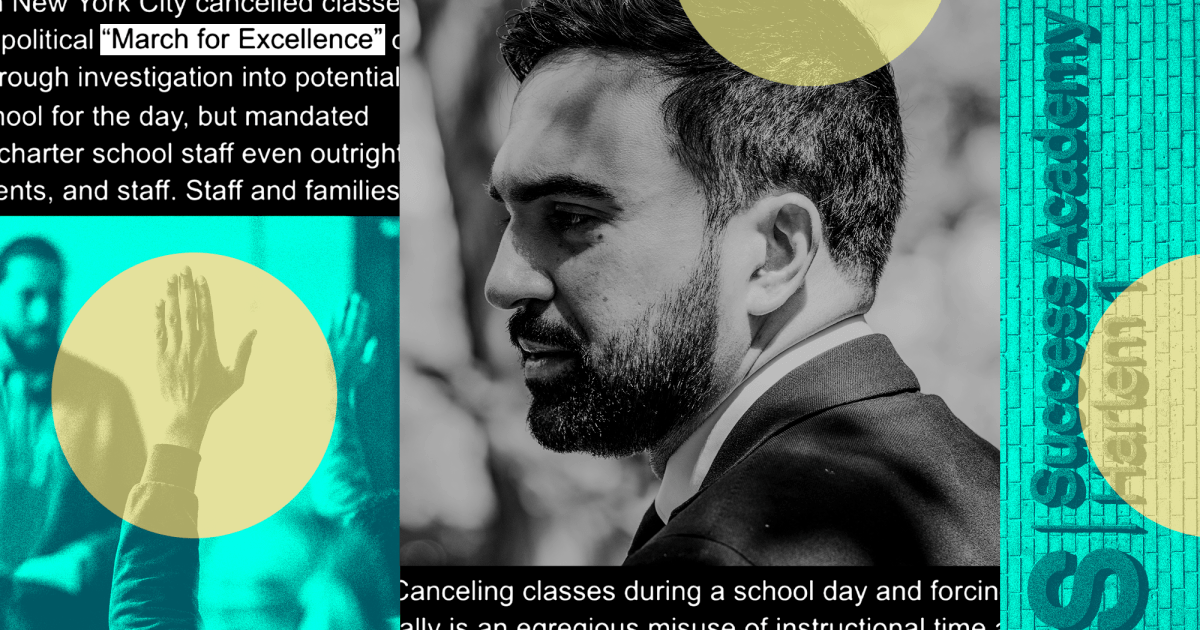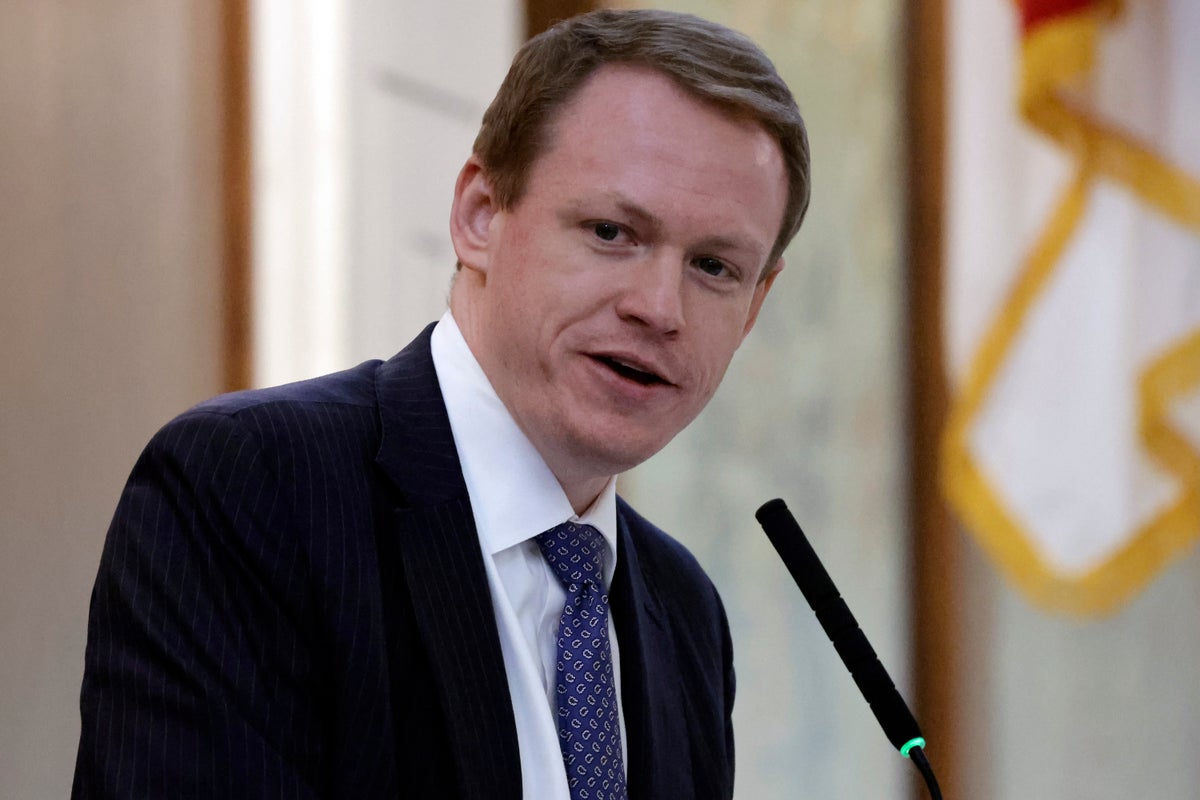A few days before a September 18th pro-charter school rally, Eva Moskowitz, the CEO of Success Academy—New York City’s largest charter school network—dropped in at a new teacher training. The visit was unannounced. Moskowitz had an urgent message for her employees that had nothing to do with pedagogy or classroom management: You need to help push the charter school agenda.
In a recording of the meeting obtained by Mother Jones, and first reported by Gothamist, Moskowitz told her workers this was a moment of “heightened risk, policy risk, political risk,” and sternly reminded them about the march for charters set to come. “You’re gonna need to get up early,” Moskowitz explained. The employees would march across the Brooklyn Bridge and rally in Cadman Plaza, she said. “You guys think you don’t have a lot of time to organize your rally? I’m sorry. Wah, wah, wah. We had eight days to organize the rally in Albany,” she said, referring to a 2014 action. “We’re facing a very serious threat.”
“I think we’re getting a little democratic here,” the CEO of Success Academy scolded. “When your boss asks you to do something, assuming it’s not unethical or a question of conscience, you do the task.”
During the meeting, Moskowitz also vented about low participation in the organization’s “Phone 2 Action” campaign, which requires every employee to reach out to New York elected officials five times, sending pre-written messages supporting charter schools.
One prospective teacher who was present at the meeting, Anita, says Moskowitz’s speech made it clear that “this [job] wasn’t about school and education at all—it felt like she was just trying to push politics onto us.” Frustrated and disappointed, Anita did not return for the remainder of her training.
Mother Jones spoke with eight current and former teachers and staff across Success Academy, who described political coercion and repression inside the network of schools. (Out of concern that Success would retaliate against them for speaking with the press, all requested that their names be changed.) The employees described an atmosphere in which they feared that to keep their jobs they needed to publicly advocate for charter schools.
Employees told Mother Jones they had been pressured to participate in the September 18th rally and conduct outreach as part of a public campaign for charters in New York City. These demands were followed up with check-ins: Leaders asked employees in public Slack channels to confirm via emoji reaction when they’d completed outreach to elected officials, demanded screenshots as evidence, called teachers after hours, and cornered educators in classrooms to check if they had sent the messages.
Erin, a teacher in her second year, says she was asked to call parents and encourage them to attend the rally. Blake, a third-year teacher, was almost daily told to send flyers home to families. Zakiyah Shaakir-Ansari, Co-Executive Director of the Alliance for Quality Education (AQE), says pressure to attend a midday political event creates an undue burden for families.
Success Academy did not respond to a request for comment and questions about the pressure to participate in politics. In a statement to Gothamist, a spokesperson said that Success has organized marches for years and no one working there should be “surprised by this or should object to standing up for charter schools.” Success did not respond to specific questions about whether there had been retaliation or firings for non-participation in pro-charter political activities.
After last week’s rally, state lawmakers called for an investigation into potential violations of state law. “Canceling classes during a school day and forcing families and students to engage in a political rally is an egregious misuse of instructional time and state funds,” State Sens. John Liu and Shelley Meyer wrote in a letter to the New York State Education Department. “Our state provides public dollars to charter schools to educate students, not for political activism or for influencing elections.” (Charter schools responded, according to the New York Post, with a letter saying the event was “not a partisan display.”)
Success has a history of involving its staff, students, and families in political actions. This year, these efforts have taken on a more prominent role after New York City nominee for mayor Zohran Mamdani won the Democratic primary.
Casey, in his fifth year at Success, says the pressure has never been so intense—and it’s been largely focused on Mamdani. “This year, in training, they explicitly started with naming Mamdani and how he is the villain in our story,” says Casey.
“They started the year off by being like ‘We’re anti-Zohran, and here’s why,” Erin says.
Success in public statements has said its political work is strictly advocacy for charters, and not about the mayoral race or specific politicians. But Moskowitz was also quoted in a recent Wall Street Journal op-ed entitled “Zohran Mamdani Threatens Charter Schools,” emphasizing the need for a mayor who is friendly to charter school interests.
Mamdani has said that he opposes raising the charter cap (which determines how many charter schools can operate in New York City), the mandated expansion of charter school operations in the city, and the placement of more charter schools inside public school buildings. As mayor, he has said he would audit existing co-located schools to review uneven funding, overcharged rent, and legal entitlements.
New York Civil Liberties Union Director of Education Policy Johanna Miller said requiring employees to participate in an anti-Mamdani campaign would be “directly undermining democratic values and diversity of thought” and “feels like coerced speech.”
“The political coercion is a form of threat under the [National Labor Relations Act] (NLRA),” said Lorena Roque, Interim Director of Education, Labor and Worker Justice at the Center for Law and Social Policy. “Being forced to do any of these things is an unfair labor practice, and then when you throw the political element in there, I think the [National Labor Relations Board] (NLRB) would be very upset.”
Although charters straddle a careful divide as privately run schools receiving public funding, they’re within the jurisdiction of the NLRB. Under nonprofit law in New York, charters can require staff to advocate for the school, but not for or against specific political candidates.
“I’m frustrated. I’m nervous all the time.”
Lee Howard Adler, a professor of critical labor and employment law at Cornell University’s School of Industrial and Labor Relations, says the political advocacy Success requires its employees sounds inappropriate, nonprofit or otherwise, if it is in reaction to “the educational ideas and political candidacy of Zohran Mamdani.”
In the recorded meeting, Moskowitz presented her demands as typical work tasks and herself as a boss simply doing what was needed.
“I think we’re getting a little democratic here,” she scolded. “We are quite hierarchical. There is a chain of command, and when your boss asks you to do something, assuming it’s not unethical or a question of conscience, you do the task.” Those who lived in New Jersey were told to list the company’s office as their address when contacting elected officials. Under Moskowitz’s watchful eye, employees were ordered to send the messages then and there.
Success board members and leaders, including co-founder Joel Greenblatt, have donated a total of $935,700 to independent mayoral candidate Andrew Cuomo directly and to a supportive super PAC, Fix the City.
Keisha, who’s been with Success for multiple years, says when she first started, she “drank the Kool-aid,” but “in recent months I’ve become more clear-eyed and realized there’s a lot of unethical and sort of inappropriate stuff happening.”
Blake, another teacher, says at his back-to-school orientation, staff were told “the current Democratic nominee represents the biggest danger to our existence since [former] Mayor Bill de Blasio.”
During de Blasio’s tenure as mayor, Success Academy opened 21 new schools and more than doubled its revenue. Joseph Viteritti, PhD, a professor of public policy at Hunter College and author of a recent book about the school choice movement, disagrees that a Mamdani mayoral win spells doom for charters. “The issue with charter schools now is whether or not you’re going to raise the cap [and] it’s not Mamdani who’s going to make that stop or go.”
Keisha said this has not stopped Success from hammering home the urgency. “I voted for Zohran, and to have the CEO state that his policies threaten our mission and if we work here we have to align with the mission…it makes me feel like we will be fired if we don’t participate,” she says. “I’m frustrated. I’m nervous all the time.”
Every long-time employee at Success with whom Mother Jones spoke described an environment of frequent, sudden, and often seemingly unjustified firings.
Keisha says a new member of her team was fired unexpectedly just weeks after starting. “Over the last six months, people are just fired left and right for no good reason,” she said.
Blake said that “you learn pretty quickly not to question anything. Just nod your head yes, so that way you don’t get hit with the big stick.”
Blake says he thinks Success makes changes to its employee handbook to justify disciplinary actions after the fact. Employees sign the handbook at the beginning of each new year, but last year was the first time they were told what changes had been made to it. Because the handbook can’t be downloaded or printed due to permission settings, Blake says, it’s often hard to compare versions to check for differences. “It’s like the Berenstein-Berenstain effect. People will say they’re pretty sure something is in the handbook, but then they go and try to find it and can’t,” he notes.
Feeling increasingly uncomfortable about the pressure to participate in the rally and Phone 2 Action campaign to contact elected officials, Casey shared his concerns with a team leader. In response, the leader pointedly turned the conversation to his job and future with Success, he said. Intimidated, Casey walked back his concerns—after which the conversation was “very positive, all smiles.” The leader told him if he knew anyone else with doubts, he should pass their name along.
“I started playing the game inside because I don’t want to lose my job and I don’t want to be targeted,” says Casey.
Viteritti says he knows Success for both its consistent high test scores, and for being “controversial,” and “very aggressive politically.” This means Success or Moskowitz should not be used as a barometer for the larger landscape of New York City charter schools, he explains. Still, asked about the political pressure, he says, “if it’s happening, it’s a problem.”
As the school year has progressed, teachers and staff say the messaging around the rally has focused less on Mamdani. But Moskowitz and other leaders have continued emphasizing the “political risk” posing “an existential threat” to Success Academy, school choice, and, by extension, their jobs.
Earlier this month, some employees received an email from an unknown sender emphasizing their labor protections and encouraging them not to attend the rally. About an hour after the message appeared, it vanished.
“I know we do have monitoring software on our laptops that allows the company to view our screens,” says Blake. “Some people were saying that while they had the email on their screen they saw a little message on the top saying that the screen was currently being viewed.”
Many Success teachers are fresh out of college, and as Moskowitz was quick to remind them during the recorded training, “most of you would not be able to be hired in [Department of Education] schools,” because they lack the necessary credentials. “We are very deliberately not unionized,” she said.
“After the conversation I had, I said to myself, ‘They’re gonna be out to get me this year. I need to make zero reason for them to fire me,’” says Casey. “In the beginning, I was a little bit more confident in like, ‘Oh, whatever happens, I’ll find another job.’ But I really am not in a position to lose my job.”
When he was first told about the rally, he planned on refusing to attend. But on September 18th, he found himself in Cadman Plaza. He felt he had no choice.















